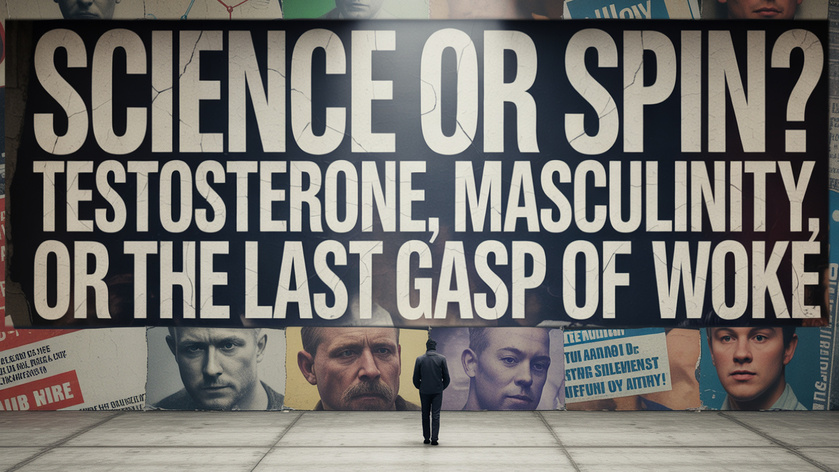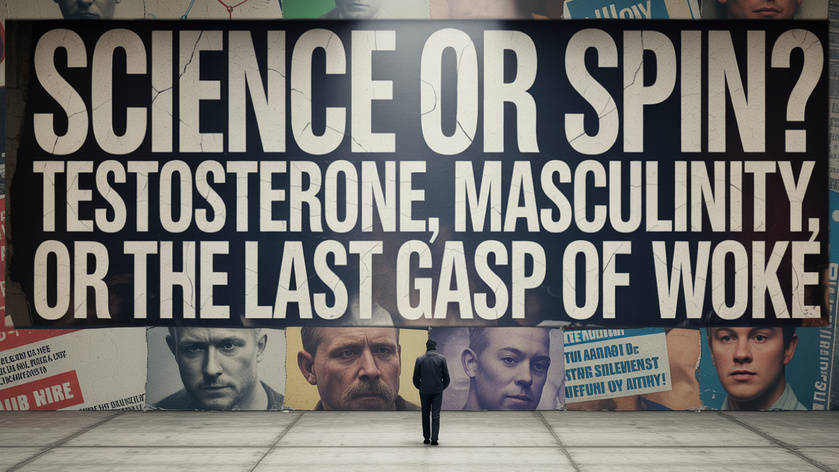This post examines a recent article published in the Psychology of Men & Masculinities (© 2024, American Psychological Association, Vol. 25, No. 4, pp. 347–356). The journal is produced by APA Division 51—the same group responsible for publications like the misandrist APA Guidelines for Psychological Practice with Boys and Men. Historically, Division 51 has maintained a strongly feminist orientation, though there are signs that it is beginning to shift, if only slightly, away from those roots. The journal issue in question is titled "Uncharted Territory: The Future of Men and Masculinities" and appears to have been a call to imagine new directions for the field. As the journal itself states: “Accordingly, we invited manuscripts for a special issue in Psychology of Men & Masculinities to envision the future of the field.” This post focuses on just one of the articles included in that special issue. See what you think.
Science or Spin? Testosterone, Masculinity, or the Last Gasp of Woke

In their recent article, “Gonadal Hormones: The Men, the Myths, and the Legends,” Burris and Knox set out to challenge what they call “essentialist beliefs about gonadal hormones” (EBAGHs). At first glance, this seems like a worthwhile goal—questioning rigid stereotypes and promoting scientific literacy around testosterone and estrogen. The authors argue that the public overestimates the causal power of testosterone, particularly in relation to aggression, strength, sexuality, and masculinity. But the deeper you go, the more the paper begins to reveal its own biases, blind spots, and ideological framing. Though the authors claim to be correcting misinformation, they often sidestep established science in favor of cultural critique—and what they leave out speaks louder than what they include.
Questioning the “Widely Held Belief” Premise
A major issue in the article is the central claim that people broadly believe “testosterone equals men” and “estrogen equals not-men.” This idea is treated as if it's a cultural fact—but the authors offer no solid evidence to back it up. No surveys. No polling. No representative data.
To be fair, the paper makes a reasonable case that some men see increasing their testosterone levels as a way to feel more masculine, and that some may view estrogen as something that could diminish that sense of masculinity. But that’s a far cry from demonstrating that the public broadly believes testosterone defines being male while estrogen signifies not being male, or that testosterone is viewed as entirely good and estrogen as entirely bad. Since these assumptions form the foundation of the authors’ argument, the lack of direct evidence to support them represents a significant flaw.
Instead of establishing the problem with data, the article relies on indirect cues—placebo studies, media examples, and scattered anecdotes. This ends up looking like a straw man: a cartoon version of what people supposedly believe, used to set up a tidy narrative arc.
The Missing Question: Why Do Men Want to Be More Masculine?
One of the strangest omissions in the paper is its refusal to ask the most important question: Why do men want to be more masculine? The authors treat this desire as something odd or unhealthy—like it’s a social problem to be solved—without ever asking what’s driving it.
The reality is that men operate in a masculine status hierarchy, where increased masculinity often brings greater access to success, admiration, influence, and romantic attention. Men at the top of this hierarchy tend to attract the highest-value partners, gain more respect, and earn more. The drive to be more masculine isn’t irrational—it’s strategic.
What pushes men upward in that hierarchy? Testosterone. It fuels status-seeking, assertiveness, and competitiveness. The work of Christoph Eisenegger has shown that testosterone’s real effect goes beyond aggression, and into a deeper, more adaptive drive to attain and maintain status.
Earlier researchers missed this by focusing only on aggression. Eisenegger and others have helped reframe testosterone as a status-regulating hormone, not a simple violence switch. Meanwhile, socially, men are under pressure from the outside as well—culture rewards success and punishes failure. The research of Joseph Vandello on "precarious manhood" captures this reality: masculinity is seen as earned and easily lost, and men are expected to prove it repeatedly. Men are driven to pursue status by both their biology and their culture—a squeeze play that uniquely impacts them from both directions. Biologically, testosterone fuels the internal drive to compete, achieve, and assert dominance, particularly in the context of social hierarchies. At the same time, cultural norms and expectations reward success and status while penalizing weakness or failure. Together, these forces create constant pressure on men to prove their worth and climb the masculine hierarchy.
When a man seeks out testosterone therapy or aims to boost his levels, it’s not because of hormone myths—it’s because he’s looking for a way to gain or protect status. EBAGHs? He’s probably never heard of them. What’s on his radar is something more immediate: respect, relevance, and success.
One-Sided Framing: Masculinity Bad, Estrogen Good?
Another problem that runs throughout the article is its imbalanced treatment of the two hormones. Testosterone is consistently tied to negative traits—aggression, narcissism, insecurity, overcompensation—while estrogen is presented as gentle, wise, and quietly life-saving.
Testosterone gets pathologized; estrogen gets celebrated.
It’s not just the tone—it’s what’s missing. There’s no mention of testosterone’s role in confidence, energy, libido, mood regulation, risk-taking, or motivation—traits that help men engage, compete, and persevere. There’s no definition of healthy masculinity and no acknowledgment of the strengths it can carry.
Meanwhile, estrogen is portrayed as a miracle compound. The article claims it supports male sexual functioning, protects against Alzheimer’s and Parkinson’s, boosts cardiovascular health, improves immune function, and enhances verbal fluency. Some of that may be true, but the imbalance starts to feel ideological.
And here’s a glaring omission: while they praise estrogen for contributing to male sexual function, they fail to mention that testosterone is essential for male sexual functioning. That’s not an obscure finding—it’s medical consensus.
This selective storytelling gives the impression that one hormone is dangerous and outdated, while the other is sophisticated and life-giving. That’s not science—it’s spin.
Selective Science and the Missing Half of the Story
The authors claim public misunderstanding of testosterone is a serious problem—but make no meaningful attempt to clarify what testosterone actually does. Instead, they pivot into speculation that “hypermasculine” beliefs push men toward things like red meat, alcohol, steroids, and fear of inadequacy.
Steroid abuse? Fair concern. But red meat and alcohol as signs of pathological masculinity? That’s a reach—and it says more about the authors’ worldview than it does about hormone biology.
They toss around the term “hypermasculinity” without defining it, and make no distinction between harmful behaviors and everyday masculine traits. And once again, no mention of healthy male striving, protectiveness, responsibility, or the deeper psychological needs testosterone helps fulfill.
Foundational work on the testosterone flood in utero from researchers like Melissa Hines is ignored. Eisenegger is cited, but not for his most important contributions. Status-seeking, fear reduction, social assertiveness, and leadership impulses—all well-studied aspects of testosterone—are simply left out.
Meanwhile, estrogen gets a glowing review, complete with a long list of benefits and few caveats.
What They Left Out
In the end, the most telling part of the article isn’t what it says—it’s what it doesn’t. The authors claim to want to dispel myths, but avoid giving readers a clear understanding of testosterone. They frame masculinity as fragile or excessive, but never define it or explore its constructive roles. They reduce men’s hormonal motivations to cultural confusion, without acknowledging the very real biological and social pressures men face to achieve, compete, and succeed.
If the goal is to move beyond simplifications, the authors miss the mark. Their narrative replaces one myth with another—painting testosterone as dangerous and masculinity as insecure, while quietly holding up estrogen and femininity as the default solution.
That’s not advancing the science. It’s just rebranding the bias.



















